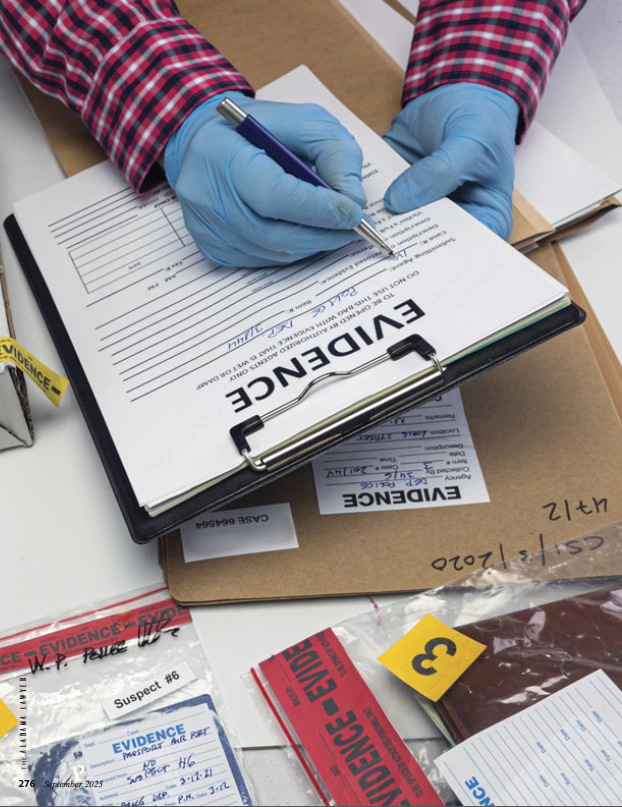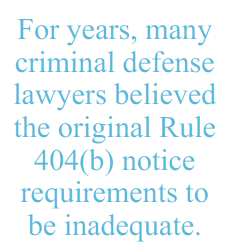An Overview of the 2023 Amendments to the Alabama Rules of Evidence
| Publication year | 2023 |
| Citation | Vol. 84 No. 5 Pg. 0277 |
| Pages | 0277 |


Introduction
On March 3, 2023, the Alabama Supreme Court approved two amendments to the Alabama Rules of Evidence that became effective May 1, 2023.1
First, an amendment to Rule 404(b) significantly changed (and increased) the prosecution's burden to provide notice of "other acts" evidence offered against the criminally accused.
Second, an amendment to Rule 803(10), the hearsay exception for the absence of public records, provides a "notice-and-demand" procedure in criminal cases when the prosecution offers a Rule 803(10) certification against a criminal defendant.
Both amendments - which apply only to criminal cases and do not impact civil cases - are consistent with amendments to the corresponding federal rules. The purpose of this article is to give the Alabama practitioner an overview of these two amendments.
Amendment To Rule 404(b)
Background
Most Alabama lawyers are familiar with Rule 404(b) of the Alabama Rules of Evidence, which allows a party to introduce evidence of other crimes, wrongs or acts for purposes other than to show the person acted in conformity with their character on the occasion in question.2 Permissible purposes for the evidence include, but are not limited to, proving motive, opportunity, intent, preparation, plan, knowledge, identity, absence of mistake, or lack of accident.3

For example, suppose a criminal defendant is on trial for stealing a woman's car, and the prosecution wants to introduce evidence that he stole the woman's purse (which contained her car keys) two days before stealing the car. This prior act is not being offered to show the defendant is of bad character and therefore must have stolen the car, but to show he had the opportunity to steal the car by obtaining the keys. This is permissible Rule 404(b) evidence.
Although Rule 404(b) evidence can be offered in both civil and criminal cases, "it obtains special importance in criminal cases, where it is typically used by prosecutors seeking to rely on a criminal defendant's prior bad act as proof of motive, opportunity, intent, preparation, plan, knowledge, identity, or absence of mistake in the crime charged."4
When Federal Rule 404(b) was originally enacted in 1974, it had no notice requirement at all. Thus, prosecutors could spring Rule 404(b) evidence against criminal defendants without warning, resulting to some extent in trial by ambush. This chaotic approach changed in 1991, when the rule was amended to add "a pretrial notice requirement in criminal cases and [was] intended to reduce surprise and promote early resolution on the issue of admissibility."5
The notice provision added with the 1991 amendment to Federal Rule 404(b) could essentially be broken down into the following three requirements:
(1) the accused had the affirmative obligation to request notice of Rule 404(b) evidence; without such a request, the prosecution had no obligation to provide notice;
(2) assuming a request was made, the prosecution was required to provide "reasonable notice" in advance of trial, or provide notice during trial if pretrial notice was excused for "good cause;" and
(3) the prosecution was obligated only to provide notice of the "general nature" of the Rule 404(b) evidence.
When the Alabama Rules of Evidence became effective in 1996, the notice requirement for Rule 404(b) mirrored that of the corresponding federal rule.6

For years, many criminal defense lawyers believed the original Rule 404(b) notice requirements to be inadequate. For example, because the rule only obligated prosecutors to provide notice of the "general nature" of any Rule 404(b) evidence, the notice often did not come with the specificity defense lawyers desired. In fact, the rule "was understood by some courts to permit the government to satisfy the notice obligation without describing the specific act that the evidence would tend to prove, and without explaining the relevance of the evidence for a non-propensity purpose."7 In short, the Rule 404(b) notice provision "proved something of a disappointment for the defense."8
Over the years, several federal circuit courts suggested that Rule 404(b) needed to be more carefully applied. Over the course of several meetings, the advisory committee to the Federal Rules of Evidence monitored these cases and considered many changes to the rule.9 Ultimately, the federal advisory committee recommended several changes to the Rule 404(b) notice provisions that became effective December 1, 2020, and these changes were based at least in part on the recognition "that some protection for defendants in criminal cases could be promoted by expanding the prosecutor's notice obligations under Rule 404(b)."10
Alabama Follows the Lead of the Federal Courts
The advisory committee to the Alabama Rules of Evidence recommended to the Alabama Supreme Court that Rule 404(b) be amended to mirror the 2020 amendment to the corresponding federal rule. The majority of the Alabama Supreme Court agreed, and Rule 404(b) was amended to read as follows effective May 1, 2023 (the entire rule is quoted to provide context):
Rule 404. Character Evidence Not Admissible to Prove Conduct; Exceptions; Other Crimes, Wrongs, or Acts

(a) Character evidence generally. Evidence of a person's character or a trait of character is not admissible for the purpose of proving action in conformity therewith on a particular occasion, except:...
(1) Character of accused. In a criminal case, evidence of character offered by an accused, or by
To continue reading
Request your trial
